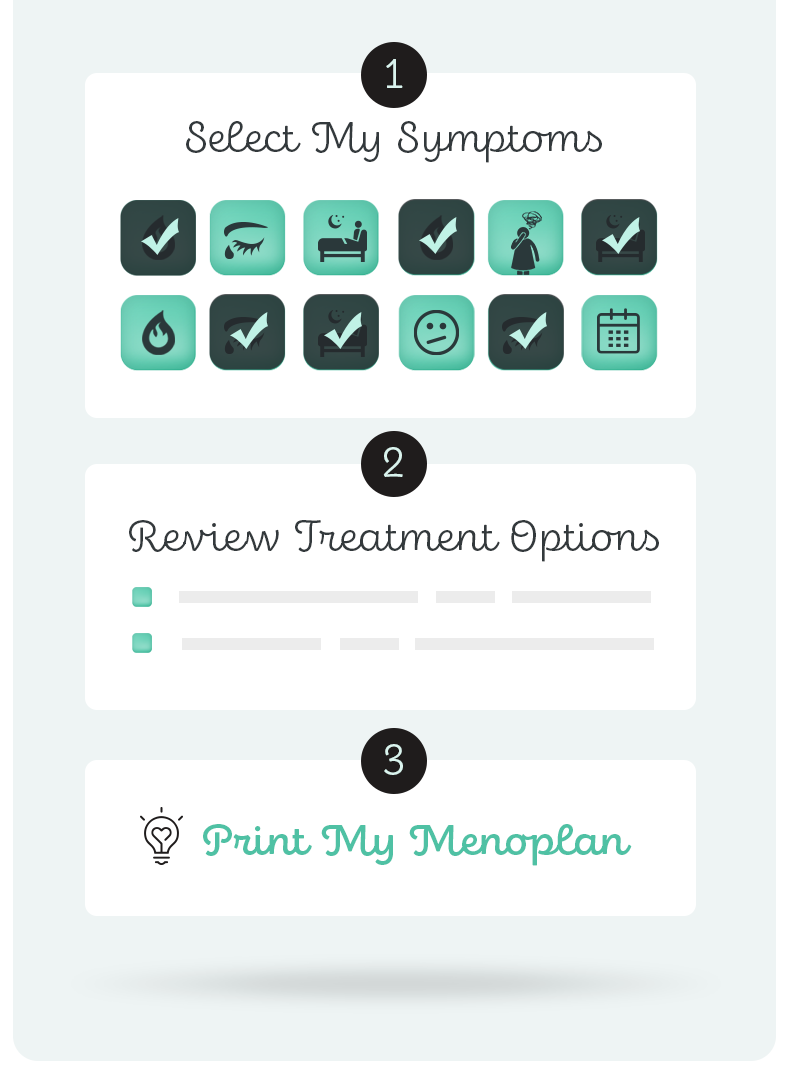Treatments
STRATEGIES TO TRY
Unfortunately, scientists are just beginning to understand the effects of menopause on the brain. We don’t have any proven interventions to deal with that feeling of forgetfulness or difficulty concentrating, but some things may help.
- Get enough sleep. Poor sleep can increase memory difficulties. If sleep is an issue for you, there are things you can do to improve your sleep. We discuss this on our page on sleep problems.
- Pay attention to your mood. If you have had mood changes such as depression or anxiety related to menopause, you may want to seek help. Worrying and other repetitive thoughts that you can’t seem to control may affect your ability to remember new information.
- If you have trouble focusing:
- turn off distractions like background television or audio. (Some people do report that instrumental music can help their concentration and mood.)
- try not to multi-task. Research shows we may believe we can multi-task, but our ability to think actually gets worse.
- Reduce your stress, since stress makes it worse.
- Try to make a habit of stress-busters like going for a walk in nature, yoga, tai chi/ Qi Gong, or other exercise. Reset yourself through meditation, or slow deep breathing /paced respiration. Make daily entries in a gratitude journal. There’s research on these approaches helping people feel less stressed, but not specifically for stress and brain fog in menopause.
- If possible, figure out how to reduce the stressors in your life. Routinize more of the everyday decisions or drop some activities that are making you stressed. Talk a therapist (e.g. one that does cognitive behavioral therapy) to help you strategize about ways to cope with stressors you cannot avoid.
- Talk with your doctor.
- If you have hypertension, diabetes, or high cholesterol, make sure they are being managed appropriately. Your doctor can also check you for anemia (iron deficiency), thyroid problems, and other conditions that can cause brain fog.
- Review your meds in case any of them make brain fog worse.
OUR BOTTOM LINE: DOES IT HELP?
UNKNOWN. There’s no data specifically for women who have brain fog due to menopause. However, the suggestions above have helped people deal with memory and concentration issues in other contexts.

BRAIN FOG / COGNITIVE ISSUES

MOOD, ANXIETY & DEPRESSION

SLEEP PROBLEMS & INSOMNIA
POTENTIAL RISKS & SIDE EFFECTS
The suggestions above should not be risky. In fact, most have positive benefits for other aspects of mental and physical health.
When adding new physical activities, be sure to start slowly or for a limited amount of time, to build up stamina. Overdoing it at first can turn you off that activity. If you have chronic health issues, talk to your doctor before beginning a new moderate or vigorous exercise routine other than walking.
QUALITY OF LIFE EXPECTATIONS
Although there is no research, dealing with brain fog should improve your quality of life.
IF I WANT TO TRY THIS TREATMENT WHAT ARE MY NEXT STEPS?
Identify the strategies that make the most sense to you, pick one or two, and try it for a few weeks. Then assess whether it made a difference for you.
To get the best sense of whether it is truly helping, each day write down (or note in your phone) what you did (or didn’t do), and your brain fog level (none, a little, some, a lot). After a few weeks, look for patterns. Decide whether to continue the strategy, add something new, or try a different combination. Keep doing your “self-experiment” as long as you feel like it may make a difference.
Maki, Pauline M. PhD1; Henderson, Victor W. MD, MS2 Cognition and the menopause transition, Menopause: July 2016 – Volume 23 – Issue 7 – p 803-805
doi: 10.1097/GME.0000000000000681
Santoro N, Epperson CN, Mathews SB. Menopausal Symptoms and Their Management. Endocrinol Metab Clin North Am. 2015 September ; 44(3): 497–515. doi:10.1016/j.ecl.2015.05.001. PMID: 26316239.
Woods NF, Mitchell ES, Adams C. Memory functioning among midlife women: observations from the Seattle Midlife Women’s Health Study. Menopause. 2000; 7:257–265. PMID: 10914619.
Authors: Dr. Leslie Snyder, Dr. Katherine Newton, & Dr. Susan Reed. Last reviewed April 23, 2021



